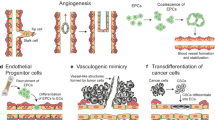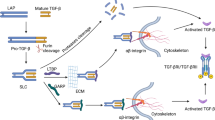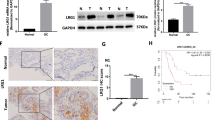Abstract
Tumor growth and metastasis depend on vessel formation, and inhibition of angiogenesis of tumor by production of anti-angiogenic drugs should be a promising approach for cancer therapy. Tumstatin is an angiogenesis inhibitor. The anti-angiogenic activity of tumstatin is localized to the 54–132 amino acids. The gene fragment encoding amino acids 45–132 of tumstatin (tum-5) was subcloned into pcDNA3.1 (pcDNA-tum5). Tum-5 protein could be expressed and secreted in CHO cells after transfection. The conditioned medium (containing tum-5 protein) from the transfectant has an anti-angiogenic effect on HUVEC cells in vitro. The anti-tumor effect of pcDNA-tum5 on mice bearing S180 tumors was evaluated. The results showed that pcDNA-tum-5 has a significant inhibition activity in the growth of the tumors. This study suggests that the gene delivery of tum-5 may be an effective strategy for cancer therapy.








Similar content being viewed by others
References
Cameliet P, Jain RK (2000) Angiogenesis in cancer and other diseases. Nature 407:249–257
Chen QR, Kumar D, Stass SA, Mixson AJ (1999) Liposomes complexed to plasmids encoding angiostatin and endostatin inhibit breast cancer in nude mice. Cancer Res 59:3308–3312
Denekamp J (1993) Angiogenesisi, neovascular proliferation and vascular pathophysiology as target for cancer therapy. Br J Radiol 66:81–96
Folkman J (1995) Angiogenesis in cancer, vascular, rheumatoid and other disease. Nat Med 1:27–31
Folkman J (1998) Antiangiogenic gene therapy. Proc Natl Acad Sci USA 95:9064–9066
Goldman CK, Kendall RL, Cabrera G, Soroceanu L, Heike Y, Gillespie GY, Siegal GP, Mao X, Bett AJ, Huckle WR, Thoma KA, Curiel DT (1998) Paracrine expression of a native soluble vascular endothelial growth factor receptor inhibits tumor growth, metastasis, and mortality rate. Proc Natl Acad Sci USA 95:8795–8800
Hurley IP, Coleman RC, Ireland HE, Williams JHH (2004) Measurement of bovine IgG by indirect competitive ELISA as a means of detecting milk adulteration. J Dairy Sci 87:543–549
Lesson-Wood LA, Kim WH, Kleinman HK, Weintraub BD, Mixson AJ (1995) Systemic gene therapy with p53 reduces growth and metastases of a malignant human breast cancer in nude mice. Hum Gene Ther 6:395–405
Ma F, Zhou L, F LQ, Bai J, Zhao J, Wang Y, Wang ZB (2007) Effect of mid-late mouse fetus microenvironment on the growth of tumor cells after intrauterine transplantation. Cell Biol Int 31:592–598
Maeshima Y, Colorado PC, Torre A, Holthaus KA, Grunkemeyer JA, Ericksen MD, Hopfer H, Xiao Y, Stillman IE, Kalluri R (2000a) Distinct antitumor properties of a type IV collagen domain derived from basement membrane. J Biol Chem 275:21340–21348
Maeshima Y, Colorado PC, Kalluri R (2000b) Two RGD-indepentdent avß3 integrin binding sites on tumstatin regulate distinct anti-tumor properties. J Biol Chem 275:23745–23750
Maeshima Y, Yerramalla UL, Dhanabal M, Holthaus KA, Barbashov S, Kharbanda S, Reimer C, Manfredi M, Dickerson WM, Kalluri R (2001) Extracellular matrix-derived peptide binds to avß3 integrin and inhibits Angiogenesis. J Biol Chem 276:31959–31968
Meng J, Ma N, Yan Z, Han W, Zhang Y. (2006) NGR enhanced the anti-angiogenic activity of tum-5. J Biochem 140:299–304
Nabel EG, Gordon D, Yang ZH, Xu L, San H, Plautz GE, Wu BY, Juang L, Nabel GJ (1992) Gene transfer in vivo with DNA-liposome complexes: lack of autoimmunity and gonadal localization. Hum Gene Ther 3:649–656
O’Reilly MS, Holmgren L, Shing Y, Chen C, Rosenthal RA, Moses M, Lane WS, Cao Y, Sage EH, Folkman J (1994) Angiostatin: a novel angiogenesis inhibitor that mediates the suppression of metastases by a lewis lung carcinoma. Cell 79:315–328
Petitclerc E, Boutaud A, Prestayko A, Xu J, Sado Y, Ninomiya Y, Sarras Jr MP, Hudson BG, Brooks PC (2000) New functions for noncollagenous domains of human collagen type IV. Novel integrin ligands inhibiting angiogenesis and tumor growth in vivo. J Biol Chem 275:8051–8061
Putney DK, Burke PA (1998) Improving protein therapeutics with sustained-release formulation. Nat Biotechnol 16:153–157
Stewart MJ, Plautz GE, Buono LD, Yang ZY, Xu L, Gao X, Huang L, Nabel EG, Nabel GJ (1992) Gene transfer in vivo with DNA-liposome complexes:safety and acute toxicity in mice. Hum Gene Ther 3:267–275
Tanaka T, Cao Y, Folkman J, Fine HA (1998) Viral vector-targeted anti-angiogenic gene therapy utilizing angiostatin complementary DNA. Cancer Res 58:3362–3369
Xu M, Kumar D, Srinivas S, Detolla LJ, Yu SF, Stass SA, Mixson AJ (1997) Parenteral gene therapy with p53 inhibits human breast tumors in vivo through a bystander mechanism without evidence of toxicity. Hum Gene Ther 8:177–185
Acknowledgements
This work has been supported by program for Changjiang Scholars and Innovative Research Team in University (PCSIRT) in China.
Author information
Authors and Affiliations
Corresponding authors
Rights and permissions
About this article
Cite this article
You, Y., Xue, X., Li, M. et al. Inhibition effect of pcDNA-tum-5 on the growth of S180 tumor. Cytotechnology 56, 97–104 (2008). https://doi.org/10.1007/s10616-007-9117-9
Received:
Accepted:
Published:
Issue Date:
DOI: https://doi.org/10.1007/s10616-007-9117-9




